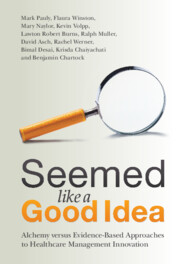 Seemed Like a Good Idea
Seemed Like a Good Idea Book contents
- Seemed Like a Good Idea
- Seemed Like a Good Idea
- Copyright page
- Contents
- Figures
- Contributors
- Preface
- 1 Baseline Observations
- 2 Evidence and Growth in Aggregate Spending and Changes in Health Outcomes
- 3 The Benchmark Decision Model, the Value of Evidence, and Alternative Decision Processes
- 4 Care Coordination
- 5 Evidence-Based Programs to Improve Transitional Care of Older Adults
- 6 Vertical Integration of Physicians and Hospitals
- 7 Evidence on Provider Payment and Medical Care Management
- 8 Evidence on Ways to Bring about Effective Consumer and Patient Engagement
- 9 The Unmet and Evolving Need for Evidence-Based Telehealth
- 10 Evidence and the Management of Health Care for Disadvantaged Populations
- 11 Driving Innovation in Health Care
- 12 Concluding Chapter
- Index
2 - Evidence and Growth in Aggregate Spending and Changes in Health Outcomes
Where Has the Battleship Been Going, and How Can We Turn It?
Published online by Cambridge University Press: 14 July 2022
- Seemed Like a Good Idea
- Seemed Like a Good Idea
- Copyright page
- Contents
- Figures
- Contributors
- Preface
- 1 Baseline Observations
- 2 Evidence and Growth in Aggregate Spending and Changes in Health Outcomes
- 3 The Benchmark Decision Model, the Value of Evidence, and Alternative Decision Processes
- 4 Care Coordination
- 5 Evidence-Based Programs to Improve Transitional Care of Older Adults
- 6 Vertical Integration of Physicians and Hospitals
- 7 Evidence on Provider Payment and Medical Care Management
- 8 Evidence on Ways to Bring about Effective Consumer and Patient Engagement
- 9 The Unmet and Evolving Need for Evidence-Based Telehealth
- 10 Evidence and the Management of Health Care for Disadvantaged Populations
- 11 Driving Innovation in Health Care
- 12 Concluding Chapter
- Index
Summary
A trite, if apt, metaphor for the American health care and insurance system is a battleship that has been sailing in a particular direction for many years, with many of us as free riders in a direction we do not prefer. That direction is characterized by spending growth that outpaces virtually any other sectoral trend in the economy, and by quality and outcome measures that, at best, improve little and, at worst, deteriorate. The battleship takes up 18 percent of gross domestic product (GDP), furnishes employment to nearly 15 percent of the workforce, and consumes a large share of federal and state governmental budgets (Figure 2.1). Even if we could figure out how to cut the power, this dreadnought would continue to coast in the same direction for the foreseeable future. The obvious conclusion is that it has been and will continue to be hard to turn the vessel to go in a different direction. As of this writing, the novel coronavirus pandemic has affected the use of care as well, putting many “normal” services on hold to accommodate sick patients. And while it is too early to conclusively confirm the effect of the pandemic on spending trends, there is likely to be an effect (although even the direction is not known). Once the pandemic stabilizes, consumption of health care services will probably not return exactly to past behaviors, but there will be a strong tendency to slide back. What might help to avoid doing so, and most importantly, what evidence can be currently offered or generated to support efforts to change course?
- Type
- Chapter
- Information
- Seemed Like a Good IdeaAlchemy versus Evidence-Based Approaches to Healthcare Management Innovation, pp. 11 - 28Publisher: Cambridge University PressPrint publication year: 2022
